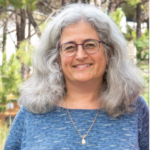Deborah Hersh
Professor at Curtin University | Dementia and Ageing Researcher

Professional Area: Speech Pathology
My research focuses on
- Experiences of people with aphasia and their families after stroke: assessment, goal setting, rehabilitation and discharge from hospital or other services
- How clinicians and people with communication disorders talk with each other, and how they build a therapeutic relationship
- Experiences of services for people with primary progressive aphasia, a form of dementia, their families, and clinicians
- Services for Aboriginal people after acquired brain injury
My research aims to
- Improve the lives of people living with aphasia and their families
- Help enable person-centred practices
- Promote research approaches which help us understand experiences of living with acquired communication disabilities and of providing services
- Improve advocacy and involvement in research projects and services
I work closely with
- The Australian Aphasia Association
- The Stroke Foundation
- Queensland Aphasia Research Centre
- I collaborate on research across Australia, and overseas, for example, with colleagues in the UK and USA.
Deborah’s Story
I started my research journey as a speech pathologist in the National Health Service in the UK before moving to Australia to work in acute, rehabilitation and community settings. Many of my patients were living with aphasia, a disorder that typically occurs after a stroke or head injury and affects the person’s ability to communicate. My research interest in aphasia rehabilitation grew from my 15 years of clinical work and from community advocacy and engagement. I was proud to establish the Talkback Association for Aphasia, the first registered charity for people with aphasia in Australia. I am interested in people’s stories, their experiences of illness and recovery and living with a disability. I am also interested in clinicians’ experiences of providing services, and how they communicate with their patients. My PhD research focused on how people with aphasia after stroke experienced discharge from therapy and transitioned from rehabilitation back to their homes, as well as how clinicians managed discharge plans. In the past 10 years, I have continued to research people’s experiences, particularly Aboriginal people’s experiences of services after stroke or brain injury. I currently volunteer as the Chairperson for the Australian Aphasia Association, a not-for-profit organisation supporting client advocacy, awareness raising and information provision. I endeavour to support the aphasia community and continue to involve their voices in my research at Curtin University.